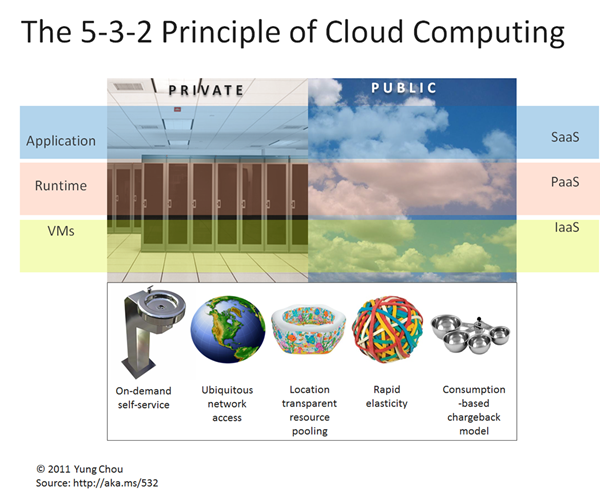Cloud Computing Goes Far Beyond Virtualization (Virtualization vs. Private Cloud, Part 1)
Virtualization vs. private cloud has confused many IT pros. Are they the same? Or different? In what way and how? We have already virtualized most of my computing resources, is a private cloud still relevant to us? These are questions I have been frequently asked. Before getting the answers, in the first article of the two-part series listed below I want to set a baseline.
- Part 1: Cloud Computing Goes Far Beyond Virtualization (This article)
- Part 2: A Private Cloud Delivers IT as a Service
Lately, many IT shops have introduced virtualization into existing computing environment. Consolidating servers, mimicking production environment, virtualizing test networks, securing resources with honey pots, adding disaster recovery options, etc. are just a few applications of employing virtualization. Some also run highly virtualized IT with automation provided by system management solutions. I imagine many IT pros recognize the benefits of virtualization including better utilization of servers, associated savings by reducing the physical footprint, etc. Now we are moving into a cloud era, the question then becomes “ Is virtualization the same with a private cloud? ” or “ We are already running a highly virtualized computing today, do we still need a private cloud?“ The answers to these questions should always start with “What business problems you are trying to address?” Then assess if a private cloud solution can fundamentally solve the problem, or perhaps virtualization is sufficient. This is of course assuming there is a clear understanding of what is virtualization and what is a private cloud. This point is that virtualization and cloud computing are not the same. They address IT challenges in different dimensions and operated in different scopes with different levels of impact on a business.
Virtualization
 To make a long story short, virtualization in the context of IT is to “isolate” computing resources such that an object (i.e. an application, a task, a component) in a layer above can be possibly operated without a concern of those changes made in the layers below. A lengthy discussion of virtualization is beyond the scope of this article. Nonetheless,let me point out that the terms, virtualization, and “isolation” are chosen for specific reasons since there are technical discrepancies between “virtualization” and “emulation”, “isolation” and “redirection.” Virtualization isolates computing resources, hence offers an opportunity to relocate and consolidate isolated resources for better utilization and higher efficiency. Virtualization is rooted in infrastructure management, operations, and deployment flexibility. It's about consolidating servers, moving workloads, streaming desktops, and so on; which without virtualization are not technically feasible or may simply be cost-prohibitive.
To make a long story short, virtualization in the context of IT is to “isolate” computing resources such that an object (i.e. an application, a task, a component) in a layer above can be possibly operated without a concern of those changes made in the layers below. A lengthy discussion of virtualization is beyond the scope of this article. Nonetheless,let me point out that the terms, virtualization, and “isolation” are chosen for specific reasons since there are technical discrepancies between “virtualization” and “emulation”, “isolation” and “redirection.” Virtualization isolates computing resources, hence offers an opportunity to relocate and consolidate isolated resources for better utilization and higher efficiency. Virtualization is rooted in infrastructure management, operations, and deployment flexibility. It's about consolidating servers, moving workloads, streaming desktops, and so on; which without virtualization are not technically feasible or may simply be cost-prohibitive.
Cloud Computing
Cloud computing on the other hand is a state, a concept, a set of capabilities. There are statements made on what to expect in general from cloud computing. A definition of cloud computing published in NIST SP-800-145 outlines the essential characteristics, how to deliver, and what kind of deployment models to be cloud-qualified. Chou further simplifies it and offers a plain and simple way to describe cloud computing with the 5-3-2 Principle as illustrated below.

Unequivocally Different
To realize the fundamental differences between virtualization and private cloud is therefore rather straightforward. In essence, virtualization is not based on the 5-3-2 Principle as opposed to cloud computing does. For instance, a self-serving model is not an essential component in virtualization, while it is essential in cloud computing. One can certainly argue some virtualization solution may include a self-serving component. The point is that self-service is not a necessary , nor sufficient condition for virtualization. While in cloud computing, self-service is a crucial concept to deliver anytime availability to user, which is what a service is all about. Furthermore, self-service is an effective mechanism to in the long run reduce training and support at all levels. It is a crucial vehicle to accelerate the ROI of a cloud computing solution and make it sustainable in the long run.
So what are specifically about highly virtualized computing environment vs. a private cloud?